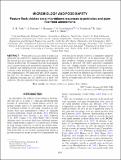Pasture flock chicken cecal microbiome responses to prebiotics and plum fiber feed amendments
Author(s)
Park, S.H.; Perrotta, Allison; Hanning, I.; Diaz-Sanchez, S.; Pendleton, S.; Alm, Eric J; Ricke, S.C.; ... Show more Show less
DownloadPublished version (719.0Kb)
Publisher with Creative Commons License
Publisher with Creative Commons License
Creative Commons Attribution
Terms of use
Metadata
Show full item recordAbstract
When prebiotics and other fermentation substrates are delivered to animals as feed supplements, the typical goal is to improve weight gain and feed conversion. In this work, we examined pasture flock chicken cecal contents using next generation sequencing (NGS) to identify and understand the composition of the microbiome when prebiotics and fermentation substrates were supplemented. We generated 16S rRNA sequencing data for 120 separate cecal samples from groups of chickens receiving one of 3 prebiotics or fiber feed additives. The data indicated that respective feed additives enrich for specific bacterial community members and modulate the diversity of the microbiome. We applied synthetic learning in microbial ecology (SLiME) analysis to interpret 16S rRNA microbial community data and identify specific bacterial operational taxonomic units (OTU) that are predictive of the particular feed additives used in these experiments. The results suggest that feed can influence microbiome composition in a predictable way, and thus diet may have indirect effects on weight gain and feed conversion through the microbiome.
Date issued
2017-06Department
Massachusetts Institute of Technology. Department of Civil and Environmental Engineering; Massachusetts Institute of Technology. Center for Microbiome Informatics and TherapeuticsJournal
Poultry Science
Publisher
Elsevier BV
Citation
Park, S. H. et al. "Pasture flock chicken cecal microbiome responses to prebiotics and plum fiber feed amendments." Poultry Science 96, 6 (June 2017): 1820-1830 © 2017 Poultry Science Association
Version: Final published version
ISSN
0032-5791